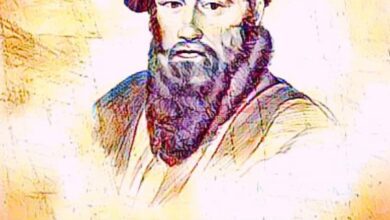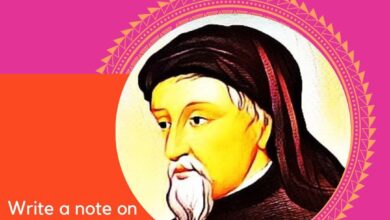Discuss Chaucer’s contribution to the growth and development of the English language

Chaucer distinguished the English language by transforming it into a social, political, and literary thinking vehicle. He served the English language in the same way that Dante served the Italian language. He unified, governed, and popularised the nation’s discordant elements. When Chaucer was in his adolescence, the English language was undergoing a period of transition.
French was the nobility’s and court’s primary tongue. After 1350, the French started to lose control over English life in general, and a Statute of 1362 signalled the English language’s complete triumph by allowing suits to be argued in English rather than French in the law courts. The victory of English over Anglo-French was aided significantly because the same tongues had spoken both languages for centuries as victory at Crecy and Poitiers (1356) stoked the flames of patriotism and national pride.
The average Englishman was oblivious to French. While French’s grip on the language was eroding, no standard form of English could take its place. English was in a deplorable state; it had been divided into four dialects, each sufficiently distinct from the others to obstruct intercommunication.
Read more Bacon’s Essays: A Blend of Philosophising, Moralising and Worldly Wisdom
Southern, Midland, Northumbrian, and Kentish dialects were distinct. The Midland dialect, or more precisely, the East Midland dialect, was the simplest in its grammatical form and devoid of the other three dialects’ inflections. Thus, East Midland English gained prominence as the language of the capital and the two centers of learning, Oxford and Cambridge, and the language in which authors and poets composed their works. Wycliffe translated the Bible into this dialect, and Gower, after experimenting with French and Latin in his English work Confessio Amantis, came around to the East Midland dialect.
Following Gower’s lead, Chaucer popularised and shaped the East Midland dialect, transforming it into a fitting means of speech for both the court and universities. It was a monumental challenge, but Chaucer overcame many obstacles that beset his job. Chaucer influenced and reformed the modern dialect. Chaucer made a significant contribution to the development of English by establishing the London dialect as the model for future writers and the ancestor of modern English. He endowed his native tongue with smoothness and suppleness it had not known since Norman times and breathed a high poetical life into this dialect.
Read also Plot Construction of Dr. Faustus
The Canterbury Tales is a watershed moment in both English poetry and the English language’s past. Before Chaucer, English was difficult to comprehend without the assistance of grammar and glossary; Chaucer’s language, on the other hand, is pure simplicity. “His language, in comparison to (say) Shakespeare’s, is simplicity itself, and any determined reader with his wits about him and a glossary at his elbow will very easily acclimate himself to a turn of phrase that is strange only to strangers of bygone fashion in dress,” Aubrey de Selincourt writes.
Chaucer contribution to english language and literature
Professor Scherillo, commenting on the frequently made argument that Dante invented the Italian language, reminds his readers that this is tantamount to claiming for the Italian poet the position of Adam in Eden when he named all the beasts of the field and fowls of the air! A similar argument might have been made about those who have dubbed Chaucer the “creator of English.” Of course, such a statement completely misrepresents the language’s growth.
Chaucer used contemporary London vocabulary, and a careful analysis of his use with that of contemporary London archives reveals that the two are identical in every way. He did not invent or modify grammatical inflections, but he seems to have contributed a few new words to the English language.
See more Chaucer art of characterization in prologue to the canterbury tales
At the very least, Mr. Henry Brabley was circumspect about attributing such contributions to the author, owing to his experience editing the New English Dictionary. It is also unlikely that Chaucer played a significant role in establishing the East Midland dialect as the dominant dialect. If he had never written a paragraph, the capital’s speech would have been standard English. However, he significantly enhanced its reputation and distinction. It was interesting that he wrote in English rather than French. He expanded the language’s literary wealth and established a precedent that has been followed by a long line of poets (FN. Robinson).
Chaucer’s Dialect Use in the South-East Midlands
Therefore, Chaucer’s language is late Middle English of the South-East Midlands variety. Compared to Anglo-Saxon or any of the other Middle English dialects, its inflections are straightforward and pose little challenge for the modern reader. However, many words retained a syllabic-e, either final or in the ending es or en, which was later dropped. The vowels retained their current continental rather than English sound in general. As a result, Chaucer’s language was very different from ours for metrical purposes. It is difficult to read his verse properly, let alone appreciate it without familiarity with older pronunciation and grammatical forms.
See also The evolution of english poetry from Sir Thomas Wyatt to Edmund Spenser
Since this experience was lost between the fifteenth and mid-nineteenth centuries, many of Chaucer’s most ardent admirers among English poets and critics have characterized his meter as erratic and rough.
Chaucer aided in the popularization of the East-Midland dialect.
Chaucer made the East Midlands dialect common among educated Londoners. He wrote in a dialect that became the mainstream English of the modern era. He was the English language’s first illuminator. He was unjustly accused of corrupting himself by embracing superfluous French terms. The truth is that, as a real Londoner, he wrote in a language influenced by French. Through this felicitous synthesis of French and English, Chaucer did a valuable service to the English language.
East-Midland Dialect Transformation into a National Language
Chaucer’s contribution to the development of standard modern English is essential, and he has traditionally been referred to as “the Father of the English Language.” However, modern philological research has contested this view, arguing that the London dialect would have taken the lead regardless of Chaucer. However, it must be acknowledged that without his influence, the establishment of the London dialect as the standard language would have been cautious and sluggish.
Related Chaucer’s portrayal of ecclesiastical characters in the prologue to the canterbury tales
Chaucer was his generation’s greatest poet. And the enormous success of his poetry helped popularise the language he used throughout the world. He channelled his vast experience into the London dialect and imbued it with the stamp of high literature; he wrote it with ease, elegance, and regularity previously unknown. All of this contributed to the dialect’s establishment as the country’s standard language.





